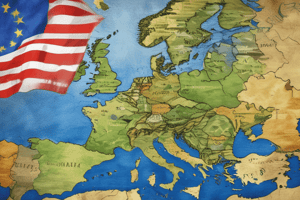Podcast
Questions and Answers
What does multilevel governance in the EU refer to?
What does multilevel governance in the EU refer to?
- A system where member states have sole decision-making authority
- A system of decision-making involving EU institutions, member states, and regional/local authorities (correct)
- A system where EU institutions have exclusive decision-making power
- A system where regional/local authorities have full autonomy
What is the difference between multilevel governance and liberal intergovernmentalism?
What is the difference between multilevel governance and liberal intergovernmentalism?
- Multilevel governance involves direct interactions among EU political authorities and sub-national entities, while liberal intergovernmentalism views states as the main political actor (correct)
- Multilevel governance focuses on EU institutions, while liberal intergovernmentalism focuses on member states
- Multilevel governance supports centralized decision-making, while liberal intergovernmentalism supports decentralized governance
- Multilevel governance emphasizes supranational decision-making, while liberal intergovernmentalism emphasizes national autonomy
In which direction does decision-making spin away from member states in multilevel governance?
In which direction does decision-making spin away from member states in multilevel governance?
- Equally in all directions
- Only up to supranational institutions
- Only down to subnational government units
- Up to supranational institutions and down to subnational government units (correct)
Which political actor does liberal intergovernmentalism view as the main actor in political interaction?
Which political actor does liberal intergovernmentalism view as the main actor in political interaction?
What does the EU practice in terms of governance, and why?
What does the EU practice in terms of governance, and why?
Flashcards are hidden until you start studying
Study Notes
Multilevel Governance in the EU
- Multilevel governance in the EU refers to a system where decision-making authority is shared among multiple levels of government, including the EU, national, and subnational levels.
- This system involves a complex web of relationships between institutions, governments, and stakeholders at different levels.
Difference between Multilevel Governance and Liberal Intergovernmentalism
- Multilevel governance and liberal intergovernmentalism are two competing theories that explain the EU's decision-making process.
- Multilevel governance emphasizes the role of multiple levels of government and non-state actors in decision-making, whereas liberal intergovernmentalism focuses on the role of national governments as the main actors.
Decision-Making in Multilevel Governance
- In multilevel governance, decision-making authority spins away from member states and towards EU-level institutions, such as the European Commission and the European Parliament.
- This shift of authority is driven by the need for collective action and policy coordination at the EU level.
Liberal Intergovernmentalism
- Liberal intergovernmentalism views national governments as the main actors in political interaction, emphasizing their role in making decisions and setting the EU agenda.
- This theory downplays the role of EU-level institutions and non-state actors in decision-making.
EU Governance in Practice
- The EU practices multilevel governance, where decision-making authority is shared among multiple levels of government.
- This is due to the complexity and interdependence of EU policy issues, which require coordination and cooperation among different levels of government.
Studying That Suits You
Use AI to generate personalized quizzes and flashcards to suit your learning preferences.




